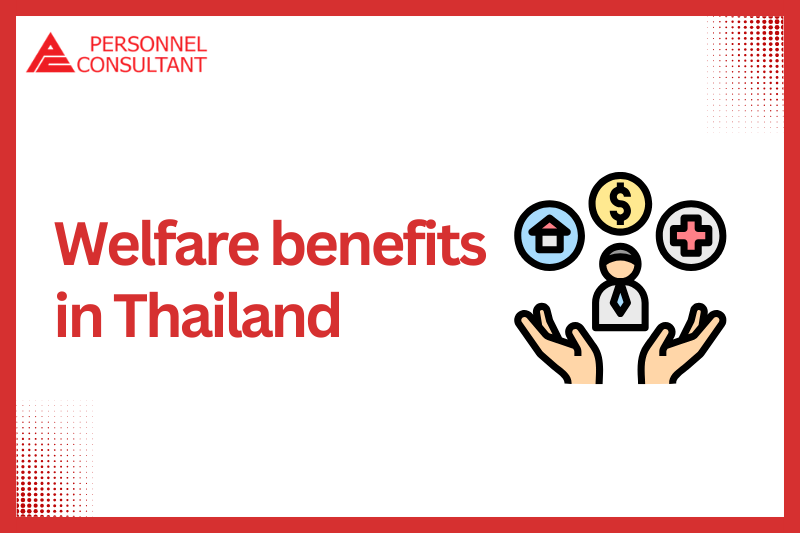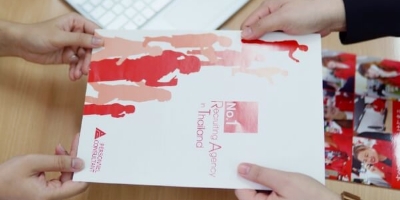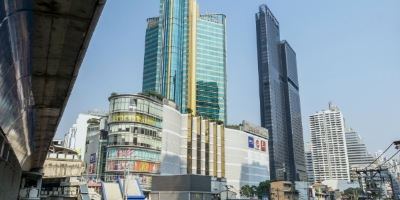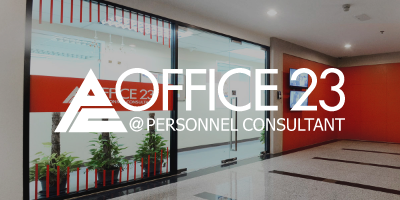
In Thailand, welfare benefits such as health insurance/assistance, provident funds (retirement savings), and commuting allowances are important.
Social security (SSO), maternity leave benefits, paid vacation, and sick leave are mandated by Thai labor laws. Furthermore, we will also explain the aspects that employees particularly emphasize when choosing a company.
■Health Insurance/Subsidy:
Companies are obligated to enroll their employees in social insurance, but since the coverage provided by social insurance is often insufficient, many companies additionally offer health insurance or subsidies for medical expenses. Subsidies for medical expenses are considered important for both Thai and Japanese job seekers. With health insurance, some plans offer subsidies ranging from 1,000 to 2,500 THB per visit for outpatient care. As for subsidies for medical expenses, employees are usually required to submit hospital receipts and medical certificates, and companies typically reimburse up to 5,000 to 10,000 THB annually as the maximum limit for actual expenses.
■Annual Health Check-ups:
In Thailand, there is no legal obligation for companies to mandate health check-ups for their employees. Instead, it is provided as part of welfare benefits, offering similar items to Japan such as chest X-rays, blood tests, urine tests, and medical consultations. Many companies opt for package plans tailored for corporate clients offered by private hospitals.
■Provident Fund (Retirement Savings Fund):
A provident fund is a fund established for voluntary participation between companies and employees, serving as a source of funds in cases such as employee resignations, retirements, illnesses, or deaths. It is similar to Japan’s Defined Contribution Pension (401K) system in concept.
Although not many newly established companies in Thailand have implemented it, there has been an increasing emphasis on provident funds among Thai job seekers. Therefore, it is recommended to consider implementing it once your business becomes stable.
■Commute Allowance:
Commute allowance is a point of emphasis for Thai job seekers. In manufacturing industries, instead of commute allowances, companies may provide shuttle buses that circulate around factory areas. Many young job seekers, from recent graduates to those with 2-3 years of work experience, often do not own cars or motorcycles due to financial reasons. Therefore, the provision of transportation by the company becomes a significant factor in their choice of employment. In cases where shuttle buses are not provided, it is common to provide a monthly allowance of around 500-1000 THB.
In non-manufacturing industries such as trading companies with offices in Bangkok, there are cases where a flat rate of 1,000-2,000 THB is provided as a commuting allowance, or actual transportation expenses using public transportation are reimbursed. Although public transportation options such as BTS and MRT have developed in Bangkok, the cost is relatively high compared to Thai wages, and many people live far from BTS or MRT stations. Therefore, commuting allowance is considered important.
■Housing Allowance:
This allowance is commonly seen in manufacturing and construction industries. In industrial zones, companies may provide a housing allowance of around 500 to 1,000 THB, or offer company-provided dormitories.
■Perfect Attendance Allowance:
This allowance is commonly found in the manufacturing industry. Companies may introduce this by providing a monthly allowance around 500 to 1000 THB for months without tardiness, absenteeism, or sick leave. Alternatively, some companies increase the allowance amount for each consecutive month without tardiness, absenteeism, or sick leave (e.g., 1st month → 500 THB, 2nd month → 750 THB, 3rd month → 1000 THB).
Even in non-manufacturing industries, some companies introduce this to deter employees from tardiness or abusing sick leave.
■Mobile Phone/Communication Expense Reimbursement:
This is primarily for sales employees who use mobile phones for work purposes. There are various patterns such as providing SIM cards, providing both mobile phones and SIM cards, or providing a subsidy of around 800 to 1,000 THB per month for using their own mobile phones.
■Employee Trips:
These trips are often organized by small to medium-sized companies as a form of morale-boosting or team-building activity. The destinations are typically within Thailand, and they are positioned as morale-boosting trips or trips for fostering camaraderie among employees.
■Sales Incentives:
This is an allowance provided based on the sales performance of sales employees. The proportion of incentives varies among companies. Some companies set a lower basic salary and a higher incentive proportion, while others prioritize a higher basic salary. It’s essential to note that many candidates prioritize a higher basic salary, so during the hiring process, it’s crucial to provide specific explanations about the level of incentives and the specific goal-setting to be undertaken.
■Gasoline and Maintenance Allowance:
This allowance is for employees who use their personal vehicles for business purposes, not for commuting. Gasoline expenses are often reimbursed based on the distance traveled, typically ranging from 5 to 7 THB per kilometer. No allowance is provided for those who use company cars.
■Language Allowance:
Japanese:
This serves as an incentive for Japanese language learning, but primarily it’s introduced to differentiate the salary between Thai employees who can speak Japanese and those who cannot. Instead of adjusting the base salary, this allowance is introduced to bridge the salary gap. It is mainly provided to employees who have obtained qualifications such as JLPT N3, N2, or N1.
English:
This is often set as an incentive for improving English proficiency or to differentiate salaries between employees who cannot speak the language. Typically, allowances are set based on TOEIC scores, such as 700, 800, or 900 points.
Thai:
It’s often set as an incentive for Japanese employees to learn Thai. Many companies use Thai language proficiency tests to determine eligibility for this allowance.
Welfare Benefits Established by Labor Laws
The following welfare benefits are stipulated by labor laws:
■Social Security (SSO)
Both employees and employers contribute 5% of the monthly salary (up to a maximum of 750 THB) as social security premiums. This includes health insurance, unemployment insurance, and pensions. For health insurance, medical expenses are covered if you visit designated hospitals. Private hospitals preferred by foreigners are not included in the coverage. Moreover, many of these hospitals may not provide high-level medical care, which may deter Thai nationals from using them.
■Maternity Leave Allowance
This allowance is disbursed from the aforementioned social security system. A maximum of 98 days, covering both pre-delivery and post-delivery periods, is recognized as maternity leave. The first 45 days are treated as paid leave, while the remainder is compensated at 50% of the average pre-delivery salary (up to a maximum of 15,000 THB) through social security benefits.
■Paid Vacation
Employees who have worked for one year or more are mandated to be granted six days or more of paid vacation. Japanese companies commonly provide around 7 to 10 days of paid vacation. Additionally, some companies allow employees to use prorated vacation days based on their date of hire immediately after the end of the probationary period, without waiting for one year of service.
■Sick Leave
In Japan, when experiencing health issues, they are typically addressed using paid vacation days. However, in Thailand, there is a system known as sick leave, where up to 30 days are granted as paid sick leave. Employees are allowed to use sick leave from the probationary period onwards. To ensure sick leave is not misused and is used appropriately, many companies require employees to submit a medical certificate when taking sick leave for three or more consecutive days, distinguishing it from regular paid vacation.
Thank you for the explanation regarding welfare benefits. As personnel consultants, we conduct annual surveys for Japanese companies in Thailand and compile the「Salary and Welfare Benefits Statistics for Japanese Companies in Thailand」report.
You can find more detailed information on the adoption rates of each welfare benefit for manufacturing and non-manufacturing industries in our personnel consultants’ statistical data.
If you wish to purchase the statistical data from our personnel consultants, please input your information through the following link:
<Application Form for Salary and Welfare Benefits Statistics for Japanese Companies in Thailand>










